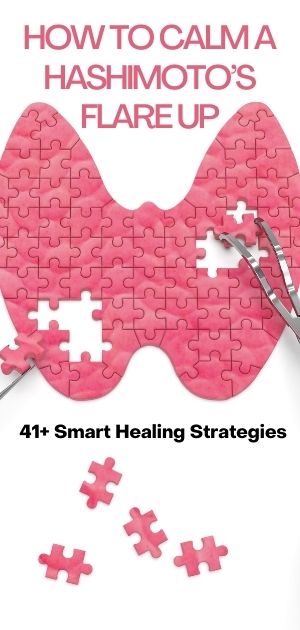If you're wondering how to calm a Hashimoto's flare-up, you're not alone. Autoimmune flare-ups in general are uncomfortable and often unpredictable. Even if you've had your symptoms under control for quite some time, flares can still pop up.
If you're wanting to know if you're having a Hashimoto's flare, you can check out my post on 24 Common and Not So Common Hashimoto's Flare Up Symptoms.
It's never fun to cancel plans and not participate in your life because you feel terrible. I've definitely had flares and they're frustrating. In this post, I'll give you some ideas on how to calm a Hashimoto's flare-up so you can get back to living your life. Many of these tips are useful for managing Hashimoto's in general but are especially important for recovering from a flare-up.
**Just a quick heads up- this post contains affiliate links which means if you click on them and buy something, I will earn a small commission (at no additional cost to you) to help continue maintaining this site.
What's a Hashimoto's Flare?
Basically, a flare-up is a worsening of typical Hashimoto's symptoms. A flare can make you feel very tired, anxious, inflamed, and generally unwell. You can read about the symptoms of a flare in this post. While it's ideal to prevent flares from happening, once they occur there are still some things you can do to manage them.
Keeping Hashimoto's in Check
There are a variety of approaches that go into managing Hashimoto's and finding balance. These include things like diet, exercise, sleep, stress management, and in many cases, thyroid medication. Finding a way to balance everything can minimize the occurrence of flares.
My Hashimoto's Flare Triggers
Knowing your triggers can help to minimize how often flares happen. Triggers are different for everyone but here are some big ones for me:
- Processed foods
- Gluten-containing grains
- Too much salt
- Excessive sugar
- Too much caffeine
- Not getting enough sleep
- Travel- Though travel has not been much of a thing over the past year, our family typically travels quite a bit. Like many, I'm prone to eating outside my normal routine during travel. I also tend to drink less water which doesn't help anything. Plus, sleep gets disturbed when traveling to other time zones and sleeping in beds that aren't my own.
Here's How Calm a Hashimoto's Flare
-
Reduce Stress
You've probably heard it before and will continue to hear it. You must manage your stress levels. Psychological stress is believed to be closely linked with inflammation and the immune response, so it has a big impact on how you feel.
Don't be afraid to say no to unnecessary "obligations"- make yourself the priority. If something feels like too much for a given day or week and it can be missed, then miss it.
Here are some things you can do to cut down on the stress:
-
Get a Massage
 Photo by Conscious Design on Unsplash
Photo by Conscious Design on Unsplash
Aside from managing stress, massage therapy has been shown to be helpful in managing inflammatory and autoimmune conditions.
-
Take an Epsom Salt Bath or Soak in a Float Tank
Autoimmune flare-ups put a lot of stress on the body and magnesium is one of the first minerals depleted. Low magnesium can cause headaches and make you feel jittery. Other symptoms might include, numbness, tingling, or muscle cramps. An Epsom salt bath can really help to bring magnesium back into the body (and relieve stress).
I only recently learned about float tanks, also called isolation tanks or sensory deprivation tanks. A floatation tank is a dark, quiet tank filled with warm, highly concentrated Epsom salt water. These are usually found in float centers and spas. The high salt concentration makes the water very buoyant so it's easy to float.
Soaking up magnesium from the water and helping with lymph drainage are a couple of great benefits. The simpler goal of float tanks is to provide an environment that lends itself to relaxation. In particular, they're designed to help you get into a meditative state. This post talks about a bunch of other benefits that float tanks provide.
-
Go Outdoors
Hiking, fishing, camping, or even just going for a walk around the block can make a huge difference in how you feel. Plus, getting sunlight and fresh air can make all the difference in your overall mood and ability to handle stress.
A little sun will also provide your daily dose of vitamin D, which is believed to have a positive effect on the immune system.
Just be sure not to overdo it with the sun as too much UV light and heat can lead to inflammation and make flares worse. In general, try to limit going out in extreme temperatures, which can trigger flares or aggravate them.
-
Work on Mindset
Our mindset can be extremely powerful in determining how we feel and the actions we take. As with anything in life, having a positive mindset can lead us towards success.
Don’t let yourself feel defeated over a flare. Having a flare doesn’t mean you aren’t healing. As you make progress with your diet and lifestyle, flares should become shorter and less frequent over time.
Along the same lines, it’s important to practice positive self-talk vs getting down on yourself. Letting that negative voice in your head take over won’t help anything.
-
Meditation and Breathing
Meditation has been shown to have a positive effect on mood, attention, eating habits, sleep, and weight. It’s also been shown to reduce stress and anxiety. You can read more about this in this JAMA Internal Medicine review.
Even if you’ve never meditated and aren’t sure how to start, there are tons of resources to show you how to do it. There are also a lot of different styles of meditation.
So while you may think it’s not for you, keep in mind there are a lot of different ways to go about it. You may find you actually like one or more of these styles.
Here are a few meditation resources:
Medito App -This is a free meditation, sleep, and mindfulness app. It provides guided meditations, breathing exercises, mindfulness practices, and relaxing sounds.
Sounds True-Sounds True is a site with tons of great books, ebooks, audio, courses, and video resources related to mindfulness, meditation, yoga and subtle movement, among others.
Headspace App-This is another wonderful app created by a Buddhist monk. It provides useful tools for meditation, stress management, mindfulness, and sleep. It’s a paid app but has a 14-day free trial.
-
Spend Time with Your Pets
Pets have a way of warming our hearts. There's a reason service animals are used as therapy in healthcare. I work in long-term care and just today, someone brought in a therapy dog to see the patients.
Literally, everyone in the large group of staff I was with oohed and awed in delight and the golden retriever sauntered through wagging his tail. Of course, it's not just the staff that love these sweet animals. Patients light up too and just a short visit can positively transform their whole day and frame of mind.
 Photo by La Miko from Pexels
Photo by La Miko from Pexels
The point is, animals can do wonders for lightening your mood. If you don't have animals at home, even just laughing at goofy cat videos can really dial the stress levels down. It may be just what you need to get your mind off whatever is worrying you.
-
Talk to a Friend or Family Member
Spend time with someone who lifts you up and brings you joy. If you can't actually be with them, give them a call.
-
Watch a Funny Show
Laughing is therapeutic so find a show that makes you happy. While binge-watching Netflix isn't generally the most productive activity, it might be just what you need to lift you out of a slump.
-
Read a Good Book
Reading is a great way to exercise your mind and transport you to other places. Curl up with some tea (or whatever you prefer) and let yourself get lost in a good book.
-
Don't Hesitate to Ask for Help
Is work completely crazy? Are you super busy running kids around? When things get overwhelming in life, it's important to know when to ask for help.
 Image by Peggy und Marco Lachmann-Anke from Pixabay
Image by Peggy und Marco Lachmann-Anke from Pixabay
Learn to recognize when you're getting overwhelmed because this impacts your stress levels in a big way. If you feel stressed on a regular basis, think about ways you can lighten your load.
For example, when it comes to running kids around, maybe you could form a carpool with other parents for school and/or sports. Maybe you could trade off babysitting duties with a friend, so you have a chance to have a couple of hours to yourself, have a date night, or get certain tasks done.
-
Drink Your Favorite Tea (preferably caffeine-free)
This is a very simple activity but can be very soothing as well.
-
Cut Back on Caffeine
While caffeine can be the thing that keeps us going, it can also make us jittery and irritable. Try to dial down the caffeine a bit to calm your nerves.
-
Try a Weighted Blanket
Weighted blankets are great for calming anxiety and improving sleep. They do this by putting gentle downward pressure on your body which creates serotonin in the brain. Serotonin is responsible for promoting happiness, well-being, and even good digestion.
Get it on AmazonThis is downward pressure is known as "grounding" or "earthing." A study published in the Journal of Alternative and Complementary Medicine showed that using a weighted blanket for "grounding" improved nighttime cortisol levels. This in turn improved the circadian rhythm profiles and resulted in improved sleep and reduced pain and stress.
- Use Your Creative Mind
Getting into creative activities that you enjoy is a great way to exercise your brain and take your mind off the stressors in your life. Here are a few ideas:
- Puzzles
- Painting
- Pottery
- Photography
- DIY Crafts
- Scrap Booking
- Join a Local Theater Group
- Drawing/Coloring Books
- Journaling
- Sewing/Knitting
- Listen to Music or if you play an instrument- Play it!
2. Do Gentle Movement
 Photo by Ginny Rose Stewart on Unsplash
Photo by Ginny Rose Stewart on Unsplash
Gentle movement can go a long way in lowering stress levels and calming a Hashimoto's flare. There are a lot of options so try to pick an activity you like doing. It's important to do something you enjoy because you're more likely to actually do it.
If you already work out quite a bit, you may want to consider cutting back a bit or dialing down the intensity to see if it helps you feel better. Some people have mentioned that pushing too hard with exercise and getting burnt out triggers flares.
Some of this can be related to the adrenal glands. If your adrenals are stressed, intense exercise can further stress them. This can affect your cortisol levels which are closely tied with thyroid hormones.
Here are a few ideas for gentle movement:
- Go for a Walk
- Do Some Yoga
- Pilates
- Gardening
- Jump on a Trampoline (mini or regular)
- Go Swimming
- Go Kayaking or Canoeing
- Dancing
- Tai Chi
- Qi Gong
- Cycling
3. Eat an Anti-Inflammatory Diet
 Photo by Caroline Attwood on Unsplash
Photo by Caroline Attwood on Unsplash
There are tons of foods many of us eat every day that contribute to inflammation. The more inflammation we have, the more prone we are to having flares. On the flip side, there are foods that are very anti-inflammatory and these are what we want to focus on.
Minimize or Cut Out:
-
Processed/Packaged Foods
-
Salt
Since regular table salt is usually iodized, eating a lot of high salt foods can lead to an excessive iodine intake which can worsen thyroid issues. This aside, excess salt promotes fluid retention and inflammation. Even more importantly, research has shown that salt aggravates autoimmune disease.
-
Refined Sugars
While sugary foods are comforting in the moment, they can cause blood sugar swings and make symptoms worse. Not only does sugar offer zero nutritional benefits, but it also takes up space that could be filled by healing nutrients. Sugar likely contributes to inflammatory processes in the body as well. Even natural sweeteners like maple syrup and honey can be inflammatory.
-
Gluten-Containing Grains
It's pretty well known that limiting gluten may help to slow the progression of autoimmune thyroid disease and lessen symptoms. One study showed that following a gluten-free diet for 6 months resulted in reduced TPO and TgAb antibodies.
-
Legumes
Legumes contain lectins which can be hard to break down. Lectins have been reported to be involved in the development of various inflammatory diseases.
-
Foods That Contain Omega 6's
Eating a diet too high in omega 6 fatty acids can cause inflammation which may worsen flares. An ideal omega 3 to omega 6 ratio is 1:4 however most Americans have a ratio of closer to 1:15.
Foods that are high in omega-6's include walnuts, safflower oil, tofu, hemp seeds, peanut butter, avocado oil, eggs, almonds, and cashews.
Foods high in omega 3's include mackerel, cod liver oil, salmon, herring, oysters, sardines, anchovies, chia seeds, flax seeds, walnuts, etc.
Things to Consume More of:
-
Fatty Fish (salmon, anchovies, and sardines)
As mentioned above, these are high in omega 3's. Nerve endings can be very sensitive during a flare causing pain. Omega 3 fatty acids in fish can help to support repair of the myelin sheath that coats nerves. They've also been shown to help to reduce inflammation and anxiety.
-
Berries
 Credit: Pixabay
Credit: Pixabay
Berries in particular are super high in antioxidants and relatively low in sugar compared to other fruits. This makes them ideal for helping to lower inflammation.
-
Turmeric
Turmeric has long been know for its anti-inflammatory properties. It is commonly taken in supplement form, especially by those trying to reduce autoimmune symptoms. Turmeric also is a wonderful warm seasoning that can be used in many flavorful dishes.
The collagen in bone broth may help with healing and sealing the gut lining. This is a very common staple when it comes to autoimmune disease and may help to ease flare symptoms.
Soups are a great way to pack in a lot of nutrient-dense veggies. Plus, warm-cooked foods are easier to digest and absorb nutrients from. Check out Wild Zora's AIP-compliant soups. They're fantastic for quick meals- just add hot water.
-
Eat Green Veggies
Vitamin k, a fat-soluble vitamin found in greens like lettuce, spinach, and kale is believed to be anti-inflammatory. In particular, increased intake of vitamin K1 could protect against inflammation.
Many people find an AIP diet to be very helpful in managing autoimmune symptoms. If you're not familiar with the Autoimmune Protocol (AIP) diet, you can read about it here.
If you're already doing the AIP diet, try to mostly focus on lean meats, fish, and vegetables (vs. getting caught up in eating baked goods or excessive compliant sugar).
-
Eat Easy-to-Digest Foods
When the body is battling a flare, the digestive system is stressed too. This means it can have a hard time properly digesting foods. You can ease the process by eating easily digestible foods.
Some easy-to-digest foods include cooked vegetables, apple sauce, bananas, sweet potatoes, cooked carrots or spinach, pumpkin, chicken, turkey, fish, salmon, gelatin, ect.
Eating well-cooked, warm foods improves digestion and absorption. Drinking warm liquids can also be very helpful in easing GI issues.
If you eat a lot of cold, raw foods and have issues with bloating or constipation, try cooking your veggies. This should help a lot. Include healthy fats to help the body use the soluble vitamins in the vegetables.
Even if you like eating salads for example, try eating them at room temp and/or adding a warm dressing.
4. Get Some Rest
 Photo by Ivan Oboleninov from Pexels
Photo by Ivan Oboleninov from Pexels
If you want to know how to calm a Hashimoto's flare up, sleep should be one of the first things to work on. Getting enough sleep is crucial for allowing our bodies to balance hormones and get rid of toxins.
Here are some ways to improve your sleep quality:
- Set a regular sleep schedule and try to stick with it.
- Get plenty of natural light during the day to improve your circadian rhythm.
- Limit Caffeine, especially after 3 pm.
- Limit screen time before bed - includes phones, computers, and tv.
- Use a white noise machine
If you've been struggling with sleep for a while, it may be worth testing hormone levels. EverlyWell offers a Sleep and Stress home kit that may help to uncover hormone imbalances. Specifically, it tests for cortisol, cortisone, creatinine, and melatonin.
Get it on Amazon- Limit or avoid alcohol
- Exercise earlier in the day, not within 2-3 hours of bedtime.
-
Get Some Sunlight
Taking in a little sunshine during the day can help regulate your circadian rhythm. Studies have shown this can improve the quality and duration of your sleep.
-
Keep Your Naps Short
If you need a nap during the day, try to keep it to less than 30 minutes. One study noted that while napping for 30 minutes or less can improve daytime brain function, longer naps may negatively impact sleep quality at night.
5. Drink Plenty of Water
 Photo by Daria Shevtsova from Pexels
Photo by Daria Shevtsova from Pexels
Water lubricates the joints, delivers oxygen throughout the body, and regulates body temperature and digestion. It also promotes optimal nerve and muscle function and makes nutrients and minerals accessible.
Symptoms like headaches, feeling dizzy upon standing, and fatigue can be related to dehydration and electrolyte issues. Getting enough water can help to flush out toxins and can improve energy levels and focus.
Make Sure Your Water is Filtered!
Many substances in our drinking water can be detrimental to our health. When it comes to hypothyroidism, fluoride is one substance that has been associated with a rising prevalence in hypothyroidism.
Look into getting a Berkey or Pelican or another water filter that feel will do the job. I got a whole house Pelican water filter for Christmas and it's been awesome!
Drinking filtered water is important but not everyone considers that we absorb toxins from water through our skin as well. A whole house water filter or even a shower filter comes in handy it comes to making sure all water touching our skin has had toxins removed.
This video talks about why chlorine and fluoride in our water is so bad for our thyroids.
6. Figure Out Your Food Sensitivities
It's possible some underlying food sensitivities are contributing to your flares. If this is the case, one way to get clues about your sensitivities is to do an elimination diet like AIP. Another way is with a food sensitivity test.
In some cases, people don't always feel completely better on AIP. Part of this can be because they are sensitive to some AIP-compliant foods and don't realize it. Leaky gut also often plays into it.
While AIP is very helpful to many people in finding food sensitivities, a food sensitivity test can help to pinpoint additional sensitivities.
While these tests are a bit controversial and to be taken with a grain of salt, they have helped me to make progress in figuring out problem foods.

7. Limit/Get Rid of Toxins

Image by OpenClipart-Vectors from Pixabay
We are constantly bombarded with toxins and chemicals in our foods, cleaning products, makeup, and personal products that can harm us.
Our bodies generally do a good job of managing them but too many of them can cause issues. In particular, with autoimmune disease, your body is already in a stressed state and excess toxins can push us into a flare
Heavy metals like lead, mercury, arsenic, and cadmium are some of the toxins that we can be exposed to in everyday life. These can be found in foods, dental fillings, air or water pollution, medicines, certain food containers, lead-based paints, etc.
Heavy metals have been shown to trigger and/or accelerate autoimmune issues (in genetically prone people). If you're curious about what heavy metals you may have been exposed to, EverlyWell has an at-home Heavy Metal Test Kit. It tests for arsenic, mercury, cadmium, bromine, selenium, iodine, and urinary creatinine.
Minimizing the toxins in your environment can help your body to function better and may help you to recover from flares faster (and prevent them).
Here are some things to look at:
-
Clean up your personal care products and cleaning supplies
A good rule of thumb is to only use products that contain ingredients you recognize and/or would eat.
Makeup and Skincare: As far as makeup and skincare go, I really like Araza Natural Beauty (Paleo Certified) and AnneMarie.
Deodorant: Pretty Frank
Pretty Frank also has lip balms, hand sanitizers, body powders, and lotion bars.
Toothpaste: Pretty Frank Mineral Toothpaste Powder
Lotion: Biriani Face and Body Cream
Cleaning Supplies:
Mrs. Myers Clean Day All-Purpose Cleaning Spray (this stuff smells so good!)
Get it on AmazonMrs. Myers Clean Day Dish Soap
Mrs. Myers Clean Day Honeysuckle Hand Soap (I can't get enough of this kind- it's awesome)
-
Try Dry Brushing for Lymphatic Massage
Dry brushing is a massage technique used in Ayurvedic medicine that helps the body to get rid of toxins. It does this by opening up the pores, increasing blood circulation, and encouraging lymph drainage. You can read more about how dry brushing can help with autoimmune symptoms here.
Get it on amazon
-
Drink Lemon Water in the Morning
Drink about 16 oz of warm or room temperature lemon water when you first wake up in the morning. Lemons contribute antioxidants, vitamin C, minerals, and essential oils. They also contain compounds that have been shown (in animal studies) to enhance the production of some liver enzymes which are involved in detoxification. One of the enzymes in lemons (diosmin) has been shown to reduce chronic inflammation in the blood vessels.
-
Do Some Jumping
As mentioned in the gentle exercise section of this post, bouncing for a few minutes each day can help to flush the lymphatic system. You can do this using a mini-trampoline, regular trampoline or even a soft mat.
-
Drink Green Juice
Make organic green juice daily to pack in inflammation-fighting antioxidants to your diet. Add a small red beet, cilantro and/or dandelion to help cleanse your liver. This is the juicer I use.
-
Work Up a Sweat
Do something active every day to work up a sweat. Sweating helps the body to eliminate toxins through the skin. Aside from exercise, saunas are great for working up a sweat as well. Make sure you shower afterwards to rinse the toxins away.
8. Calm A Hashimoto's Flare by Managing Pain
Work on finding ways to manage your flares not just during an autoimmune flare but before it happens.
-
Know When Medication is Needed
It's important to know when to use medication for pain. Phoenix Helix has a great post about that here.
-
Consider Acupuncture
Some people find acupuncture extremely helpful in managing a flare. Acupuncture treats conditions ranging from musculoskeletal problems (back pain, neck pain, and others) to nausea, migraine headache, anxiety, depression, insomnia, and infertility.
-
Deep Breathing
-
Look into Biofeedback
-
Massage
9. Consider Vitamin and Mineral Deficiencies
 Photo by Michele Blackwell on Unsplash
Photo by Michele Blackwell on Unsplash
Being deficient in various vitamins and minerals goes with the territory when it comes to autoimmunity. Supplements can be super helpful but need to be catered to the individual. It's generally best if you can test your levels of certain vitamins and minerals before supplementing.
*This is just a general list and it's not all-inclusive. I list a few supplements that I like but it doesn't mean they are right for everyone. Always check with your doctor if you're unsure about which supplements are right for you. Keep in mind that if you are taking certain medications, they could interact with some supplements.
Here are a few that are beneficial for many people when it comes to managing autoimmunity and calming Hashimoto's flares:
Selenium plays an important role in thyroid hormone metabolism and protecting against oxidative stress, among other things. It plays a crucial role in converting thyroxine (T4) to triiodothyronine (T3).
In fact, selenium deficiency has been associated with several thyroid disorders. The body doesn't make selenium so it has to be consumed. Plus, it may also decrease thyroid antibodies.
Get it on Amazon
Vitamin D is a very prevalent supplement in the autoimmune world, especially in thyroid disorders. It is known to modulate the immune response, decrease inflammation, and even decrease autoimmune antibodies.
Several studies have been able to show a correlation between vitamin D deficiency and thyroid antibodies. Our bodies are able to make vitamin D from the sun, so spending a little time outside each day is a great way to get your vitamin D.
We can also get it from some things in our diets like fatty fish and egg yolks.
You can ask your doctor to check your vitamin D levels or get an at-home vitamin D kit to check it.
The omega 3's in fish oils have been shown to have anti-inflammatory properties and may help to decrease autoimmune disease activity. I love Nordic Naturals.
Get it on Amazon-
Turmeric/Curcumin
Turmeric has long been known for its medicinal properties. It contains powerful antioxidants and has been shown to reduce inflammation and combating oxidative stress. You can read more about all the ways curcumin helps us here.
-
Digestive Enzymes
Enzyme deficiency can contribute in some ways to thyroid symptoms and autoimmunity. Having the proper enzymes can go along with promoting good digestion. Basically, anything you can do to help your body digest food and better access nutrients will be helpful. Izabella Wentz has a great article on digestive enzymes here.
-
Probiotics
Probiotics also promote good digestion by adding beneficial bacteria to your gut. This in turn promotes a healthy immune response and reduced inflammation. When your gut has a diverse microbiome, it's better able to do its job which means better digestion, mental health, and overall health.
-
Magnesium Citrate
Magnesium citrate increases water in the intestines which can help with constipation. I take this one. Be cautious with magnesium supplements though. While it's helpful for many, others have reported that magnesium seems to contribute to flares. I don't know how common this is but it's worth noting.
-
NAC (N-Acetyl Cysteine)
NAC is a powerful antioxidant and tool when it comes to calming a Hashimoto's flare or dealing with Hashimoto's in general. It is a precursor to the production of Glutathione which protects the thyroid against hydrogen peroxide.
NAC has anti-inflammatory and detoxification properties, plus it helps to combat oxidative stress. According to Isabella Wentz, it has also been shown to reduce thyroid antibodies. You can read more about that here.
-
Vitamin C
Vitamin C is another powerful antioxidant that may help to reduce oxidative stress on the thyroid. It also plays a big role in collagen production which is important for supporting a healthy gut lining.
Additionally, it may also decrease thyroid antibodies.
-
Vitamin B12
B12 deficiency is very common in Hashimoto's patients. In fact, one study showed that about 40% of hypothyroid and Hashimoto's participants were B12 deficient.
For those that were low on B12, symptoms included weakness, impaired memory, depression, numbness, and decreased reflexes. B12 plays an important role in energy metabolism so if you are deficient, you may see an energy boost by adding it in.
B12 can interact with certain medications like chloramphenicol (Chloromycetin®), proton pump inhibitors, histamine H2 receptor antagonists (like cimetidine (Tagamet®), famotidine (Pepcid®), and ranitidine (Zantac®)), and metformin. People who take these should check with their doctor before adding in B12.
Additional Supplements- Benefits Vary Person to Person
Ashwagandha- This is a fairly controversial supplement. For some people with thyroid issues, it's super helpful. Some studies have been able to show that ashwagandha improves thyroid hormone levels. On the other hand, it's been shown to boost immune system function which could make things worse.
10. Remove Unnecessary or Incorrect Supplements
Some supplements or the fillers in them may actually contribute to flares. It can take some time to figure out which ones are causing problems but keeping a symptom journal (especially during flares can help with this). Also, in general, try to choose supplements with minimal additives and allergens.
11. Breath Clean Air
 Photo by Eli DeFaria on Unsplash
Photo by Eli DeFaria on Unsplash
 Get it on Amazon
Get it on Amazon
12. Be Kind to Yourself
Try not to beat yourself up or feel like you've failed because of a flare. They happen and it's not always in your control. Negative self-talk only makes things worse by stressing you out and potentially making flares more intense.
13. Manage Your Blood Sugars
Blood sugar imbalances are commonly associated with Hashimoto's but are also often overlooked. Having high blood sugar levels can be very inflammatory, so if you have diabetes it's important to keep blood sugar levels in check.
This is because insulin surges and drops can trigger flares. Stabilizing blood sugars involves most of the things talked about in this post. These are eating an anti-inflammatory diet, exercising, and getting enough quality sleep.
If you're unsure about your blood sugar levels you can ask your doctor for an HbA1C test. This gives an accurate picture of your blood sugar control over the past 3 months. You can also test it at home with an HbA1C kit.
14. Get Your Hormones Checked
There seems to be a strong relationship between thyroid hormones and sex hormones. Also, thyroid health and hormones are not a one-way street. By this, I mean various hormones can affect thyroid health and thyroid health can affect various hormone levels. This is just something to keep in mind.
-
Thyroid Hormones
If your flares last a long time, say more than a week or two, it may be worth checking your thyroid hormone levels. Specifically, T3/T4 can have a huge impact on how you feel.
For example, sometimes the body has trouble converting T4 to T3, you may experience symptoms like fatigue, depression, sensitivity to cold temperatures, difficulty concentrating etc. If your thyroid hormones are out of an acceptable range, you may need to work with your doctor on adjusting (or adding) medication(s).
If you want to check your thyroid levels, there are at-home thyroid tests available. You can save 15% at EverlyWell by using the code RESULTS15.
-
Adrenal Hormones
Adrenal hormones help to regulate your metabolism, immune system, blood pressure, stress response, and other important functions. While the adrenal glands also secrete sex hormones, we'll talk about those below.
One adrenal hormone to pay attention to is cortisol which controls the sleep/wake cycle. Cortisol levels can often be high in Hashimoto's patients. Cortisol is often referred to as the stress hormone. In the short term, it (along with epinephrine) can help provide the energy needed for a fight or flight response.
It does this by flooding the body with glucose for energy and inhibiting insulin production. This keeps glucose in the bloodstream longer, allowing you to run away from whatever danger you're in. If this continues over the long term, however, this chemical response can lead to excess glucose production and elevated blood sugar levels.
When cortisol levels are chronically high because of ongoing inflammation and stress, digestion and absorption are compromised which can cause the mucosal lining to be irritated and inflamed.
If you're curious about your cortisol level, you can use this test kit.
-
Sex Hormones
Estrogen, Progesterone, and Testosterone play an important role in thyroid health and can contribute to autoimmune flares.
Estrogen can actually stimulate the growth of the thyroid gland which means too much estrogen can lead to an enlarged thyroid or a goiter. It can go the other way as well where low estrogen equals inadequate thyroid tissue.
Estrogen dominance is actually known to be a Hashimoto's trigger. Women with estrogen dominance often have trouble clearing estrogen from their bodies properly due to impaired detoxification pathways.
One form of estrogen dominance happens when estrogen levels are simply high. In another form, estrogen levels may be normal but progesterone is low so things are still out of balance.
Signs of Estrogen Dominance Include:
- PMS and PMDD
- Fibroids
- Endometriosis
- Ovarian cysts
- Thyroid nodules
- Thyroid cancer
- Ovarian cancer
- Mood swings
- Infertility
- Miscarriages
- Water retention
- Tender breasts
- Irregular periods
- Heavy periods
- Hair loss
- Headaches/migraines
- Brain fog
- Insulin resistance
- Lowered libido (sex drive)
- Osteoporosis
- Autoimmunity
If you know or suspect you have estrogen dominance, this post covers some lifestyle interventions that can help bring things back into balance.
EverlyWell has a pretty well-balanced test kit that includes many of the hormones mentioned above.
The Women's Health Test includes:
- estradiol
- progesterone
- DHEAS (adrenal)
- follicle-stimulating hormone
- free testosterone
- cortisol
- TSH
- free T3
- free T4
- thyroid peroxidase antibodies
While I believe in self-ordering and interpreting for most labs. For this one, I'd recommend consulting a practitioner for the interpretation of this particular test. This is because, it can be a bit complicated to interpret and hormones, when not addressed properly, can be dangerous.
Managing Hashimoto's and Finding Root Causes
Diet and lifestyle are very powerful tools in helping to control Hashimoto's and most autoimmune disorders. You will not get better just from taking medications. While medications are sometimes needed, they mostly just address the symptoms, not the cause.
Certain elements are causing your body to attack your thyroid. Figuring out what those are is key.
I've personally been using Paleo and AIP in various stages/forms over the past year and a half to help manage my Hashimotos. While it does help a lot, I've not been able to get into remission yet. So, I've also been seeing a functional practitioner to dive deeper into other possible root cause factors.
We're not there yet but we've found a few clues. Given a very high total IgE (over 4000 with a reference range under 499) and high eosinophils (about 10%, usually runs under 3 or 4 for most), my allergies seem to be a big contributor.
I also have a lot of food sensitivities- many of which are foods included in an AIP diet. A big part of this is likely related to leaky gut, so we have been working on healing it.
We're still working through it but I wouldn't have known a lot of these things without seeing a functional practitioner and getting more in-depth with testing.
The point is to keep working on figuring out your root causes. You may need to reach beyond the initial diet and lifestyle interventions to figure it out.
Resources
If you're having frequent flares, there are probably underlying causes that need to be addressed.
If you're wanting to explore root causes but seeing a functional practitioner is not financially an option right now, the Hashimoto's Self-Management Program may be useful. You can save $100 off the normal price of the program by using my affiliate discount link.
Paloma Health is a great option as well. They specialize in hypothyroidism/Hashimoto's and offer affordable online consultations and testing. They also have a free app that walks you through the AIP diet and other lifestyle interventions. It also has a bunch of AIP recipes.
Find Out What Triggers Your Flares
The best way to prevent an autoimmune flare is to find out what causes them.
What causes a Hashimoto's flare is different from person to person. Keep track of your symptoms noting aches, pains, food reactions, energy level, skin condition, hair loss, etc. Using a journal or symptom tracker can help to pinpoint common and recurring triggers.
By identifying triggers that lead to flares, you may be able to lessen to frequency and/or intensity of your flares.
*I am not a doctor - just a Hashimoto's sufferer. This article is meant as encouragement and is not meant to replace any advice from a medical practitioner. Please check with your own doctor if you have any medical-related questions regarding your autoimmune disease.
If you enjoyed this post, you may also like:
Thyroid Hormones and Antibodies- Diagnosing Hashimoto's
Relationship Between SIBO and Hashimoto's
24 Common and Not so Common Hashimoto's Flare Up Symptoms
Beginner's Guide to the Autoimmune Protocol
Don't Get Glutened! Use These Strategies to Protect Yourself
Conclusion:
I hope you found this post useful. What do you do to calm Hashimoto's flares? What are your triggers? Leave a comment below!
Don't forget to follow me on Instagram @foodcourage for the latest AIP/Paleo recipes, autoimmune nutrition info, and Food Courage happenings!
If you liked this post, please share it!








Leave a Reply